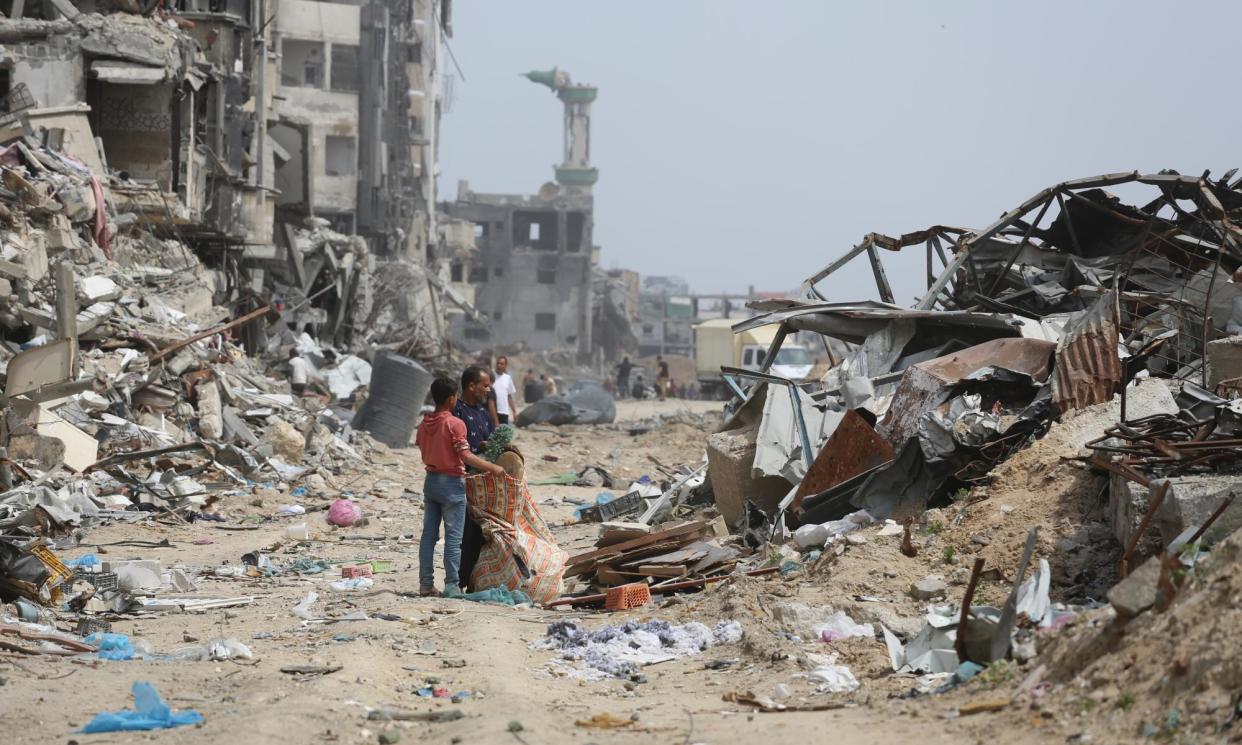David Cameron to set out UK basis for continuing arms sales to Israel

David Cameron will set out the UK’s reasoning for continuing to export arms to Israel on Tuesday as ministers face ongoing pressure to disclose the official legal advice on the trade.
The foreign secretary will discuss the Middle East crisis with his US counterpart, Antony Blinken, on a visit to Washington where he is also expected to give an update on the UK’s arms export regime.
Downing Street said it had no plans to publish the legal advice but that it wanted to be transparent about its decision to continue exporting arms during the Gaza conflict.
Related: Monday briefing: The ‘unprecedented’ pressure to suspend arms exports to Israel
“We are obviously aware of the interest in this issue and we will always look to be transparent about our decisions on these matters whilst respecting the longstanding convention that we don’t publish legal advice on these issues,” the prime minister’s official spokesperson said.
Rishi Sunak has come under mounting pressure from senior Conservatives – including the veteran peer Nicholas Soames and the chair of the Commons foreign affairs committee, Alicia Kearns – to suspend weapons exports in light of the growing humanitarian crisis in Gaza.
The calls follow an attack that killed seven aid workers, including three Britons, who worked for the food charity World Central Kitchen.
Keir Starmer also faces pressure to back an end to arms sales after calls for the government to consider immediate action made by the London mayor, Sadiq Khan; the Scottish Labour leader, Anas Sarwar; and the Labour MP Margaret Beckett, who was foreign secretary under Tony Blair.
The UK’s arms exports regime would prevent the supply of weapons to Israel if there was a clear risk that the items might be used to commit or facilitate a serious violation of international humanitarian law. UK companies provide about 0.02% of Israel’s overall arms imports.
The No 10 spokesperson insisted the government was “completely united” over the conflict despite claims of a cabinet split, with Lord Cameron taking a more strident approach to criticism of Israel than some of his colleagues.
The deputy prime minister, Oliver Dowden, had suggested there was a “bit of relish from some people” about the opportunity to criticise Israel, although No 10 rejected the notion he was referring to Cameron.
Mel Stride, a close ally of Sunak, said on Monday that Israel “abides by the rule of law” but – echoing the foreign secretary’s remarks – stressed that UK support for the country was not unconditional.
The work and pensions secretary said: “We expect Israel not to do the kinds of things that happened with the aid workers, and we have made it very clear that we are appalled by what happened there.”
The Israeli military has withdrawn its forces from the southern Gaza city of Khan Younis but could still mount an offensive against Hamas’s last stronghold in Rafah despite the UK and US leading international pleas for restraint.
After six months of conflict triggered by the 7 October massacre by Hamas in southern Israel, hundreds of thousands of Palestinians have fled to Rafah. Any large-scale assault would be likely to lead to a high death toll.
Cameron will also use his trip to warn that the US is risking the west’s security by holding up a new package of aid for Ukraine, meeting key figures across Congress to call for them to unblock an extra $60bn (£47bn) in funding.
He will hold talks with the national security adviser, Jake Sullivan, and the Senate Republican leader, Mitch McConnell, and is hoping to meet the House speaker, Mike Johnson, whose colleagues are preventing the vote on Ukraine aid.
“Success for Ukraine and failure for [Vladimir] Putin are vital for American and European security,” Cameron said before his trip.
“This will show that borders matter, that aggression doesn’t pay and that countries like Ukraine are free to choose their own future.
“The alternative would only encourage Putin in further attempts to re-draw European borders by force, and would be heard clearly in Beijing, Tehran and North Korea.”
The UK announced another £2.5bn in aid earlier this year to help Ukraine fight the Russian invasion and the EU has pledged another £43bn.
The Ukrainian president, Volodymyr Zelenskiy, has said his country would lose the war unless Congress passes the military assistance package. “If Ukraine loses the war, other states will be attacked,” he said.


